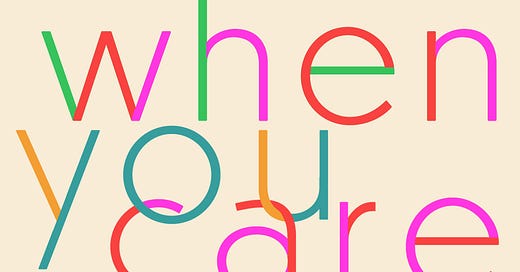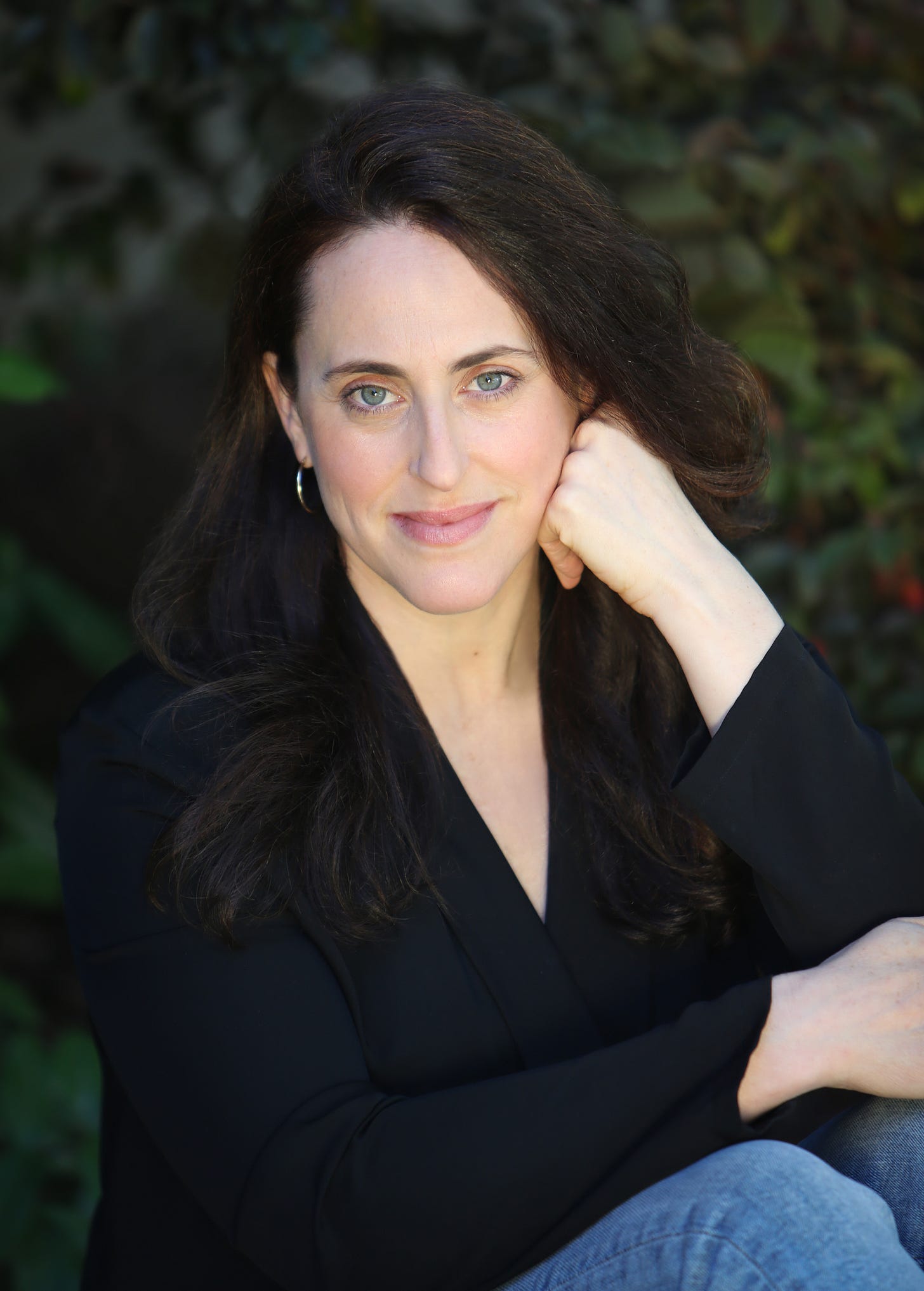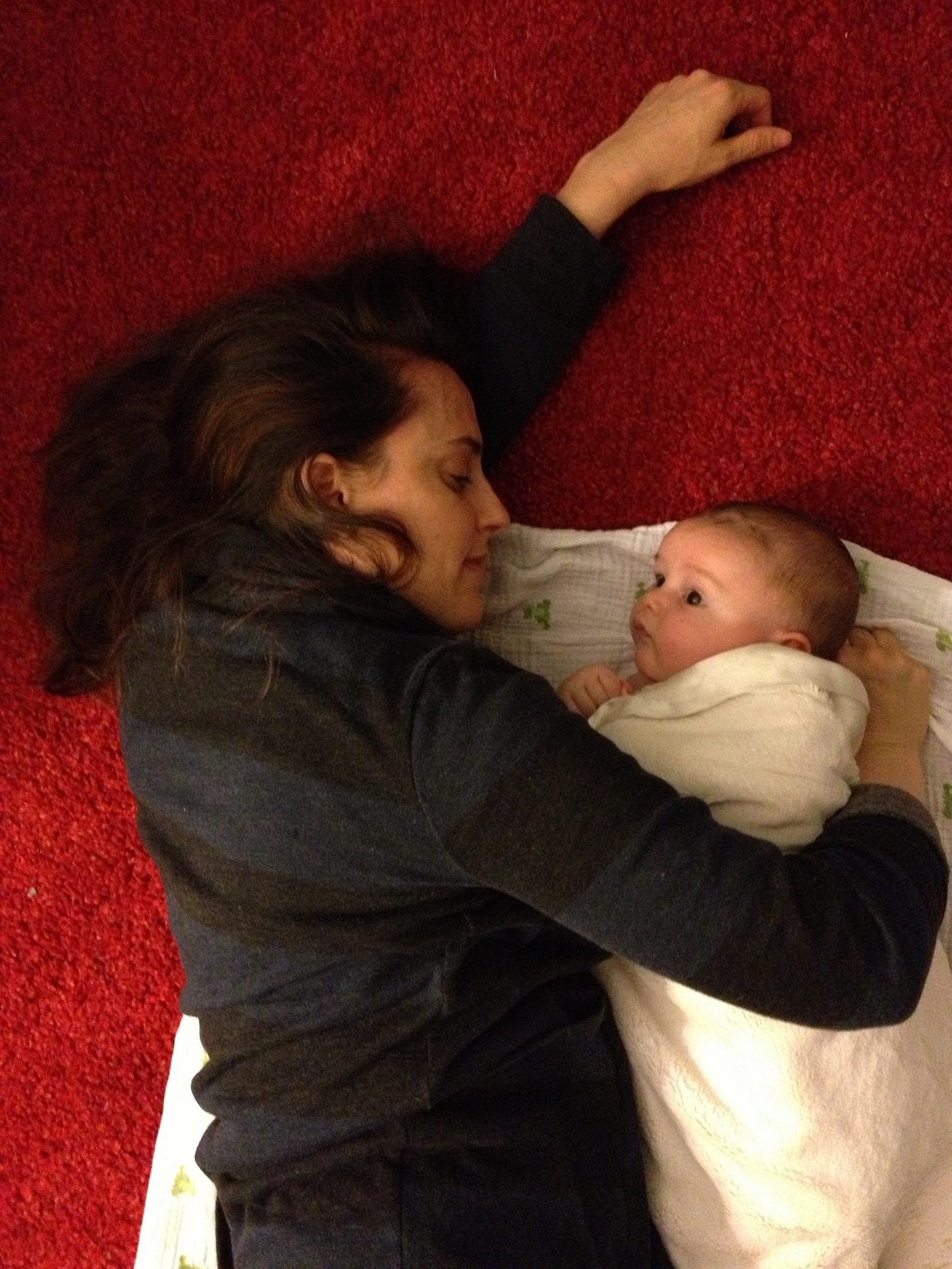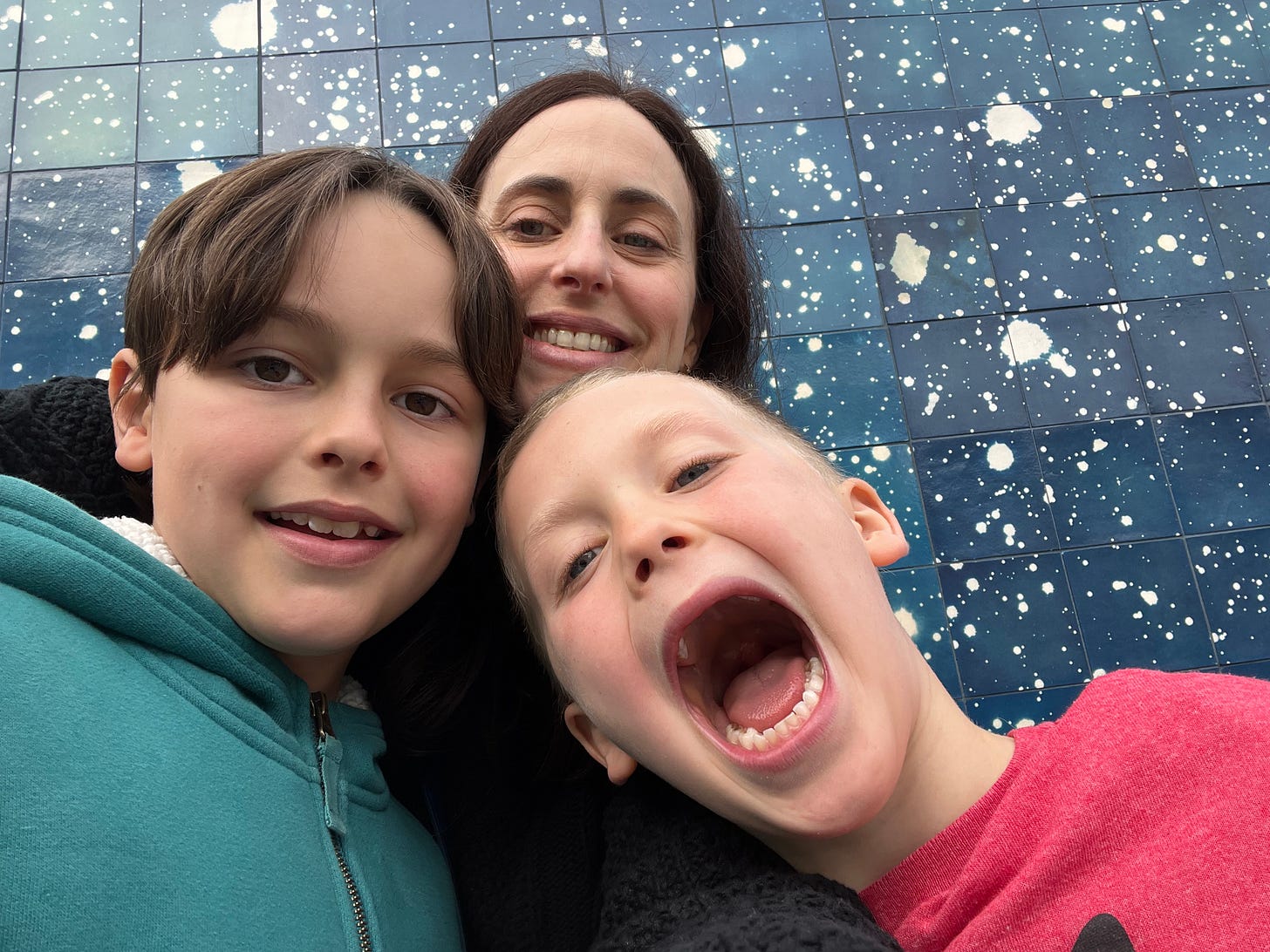Maybe those “little white lies” we tell our kids aren’t so bad
A review + conversation with author Elissa Strauss - and another GIVEAWAY
I’ve had the chance to read When You Care: The Unexpected Magic of Caring For Others by Elissa Strauss, which brings a slightly different perspective into the caregiving genre. Instead of being focused on the hows and whys and who-pays-for-it questions of caregiving (though those are in there too), Elissa delves into the way in which caregiving can be transformative for us - the caregivers. Care isn’t a one-way street where only the person receiving care reaps the reward, there are transformational benefits for the caregiver too.
What is ironic about caregiving is that it’s both rewarding and exhausting at the same time. This fusion makes it something we, as parents, loathe to be chained to and yet also have apprehension about escaping. Search “mom guilt” online or social media and you’ll find millions of headlines. (Search dad guilt - the headlines are still there, but not as much).
So I wanted to talk to Elissa about this pull and push of caregiving, and the philosophy she’d researched about care ethics - providing an entirely new framework and justification for the parents who feel the need to tell a little white lie every now and again. My youngest still believes that the reason we can’t get the ice cream truck every day is because I forgot my wallet.
Elissa is a journalist, one who understands the power of a good book and a good Substack, and she’s generously offered a copy of her book to one reader from
! Giveaway details are at the bottom of this newsletter - and thanks again for reading!Convo with Elissa Strauss, photo courtesy of Elissa
Q. Elissa, I feel like so much of our conversation centers around women, but as a mother of two boys I feel you made sure to go out of your way to include men in this conversation - so thank you for that. One part that stood out to me was that the more unpaid care work that men do, the lower their suicide mortality rate is. That line was a complete ‘whoa’ moment for me. When we think about men and care, a lot of the conversation is framed around helping out their partners, or being a good role model. Much less is centered on how it’s helpful for their own well-being. Can you expand on that?
Elissa: I think the topline news on men and care in recent years has been that they don’t do enough, and it is hurting women. That is a very important point and I love all the energy that has gone into fixing this problem, especially Eve Rodsky’s work with “Fair Play.” Less discussed, however, is how men are doing more care and domestic labor than ever-- just this morning I read a study that said that 60% of moms under 30 report equally sharing household responsibilities with a partner. How about that?
Even less discussed is the fact that men are invested in their care identities, which I discovered in lots of different research including wonderful work by the Better Life Lab. And why are men invested? Pure altruism? Nah. Men get a lot from care. It gives them a chance to explore ways of being that mainstream masculinity does not -- namely they get to be vulnerable, emotional, sensitive and empathetic. Also, it gives them a different way to matter and feel their lives have purpose and meaning, which, as one study shows, is actually protective against suicide.
Lastly, while I can’t say whether this is nurture or nature -- we will never know -- I have tried to raise my two sons with a real care ethic and a care ethic they have. My 11 year-old son Augie loves babies and seems to get real delight and satisfaction in simply being on the floor with them and entertaining them for hours. This provides great relief for new moms who very much need a break from such a thing. Seven-year-old Levi always tries to care for a family member when they are sick, making them food, bringing them stuffed animals and at least 15 “Feel Better” cards. As my friend Ruth Whippman makes clear in her new book “BoyMom” -- boys aren’t fundamentally without the capacity to care, but taught from an early age that care and masculinity are antithetical.
Q. I read much of your book as a way to challenge a lot of the assumptions we have surrounding parenting and what our roles should be. One line stood out to me, about a different approach to caregiving that views parenting “as a wonder and not a checklist.” Do you see this sort of checklist-parenting as something that is specific to our current generation, or has this always been there, just in different forms?
Elissa: Before I dive into wonder and generational trends in parenting, I want to make clear that much of my experience with parenting involves checklists--checklists that overwhelm me, checklists I often fail to reference or complete. (We forgot to send Levi, age 7, to school with swim clothes again this week.) There is no escaping the checklist!
But when parenting becomes only or mainly about checklists, and not just ones featuring the practical matters we need to tend to throughout the day, but also external notions of success about our child’s future achievements, then something is wrong.
In order for parenthood to be meaningful, something we actually enjoy, we have to find a way to tap into the unexpected, unfamiliar, inexplicable in it and experience those occasional flashes of beauty and joy such states can bring. This can’t happen if we have planned the whole experience in advance, and any detour is a failure.
When the whole experience is informed by these plans, the “checklists,” and the ability to meet the practical needs of children is made very difficult by the fact that having kids is such an economic burden (universal and affordable childcare please!), this life-affirming, provocative and generative wonder is very hard to access.
While this tension between parenting as a checklist and parenting as an improvised journey has always been around, it is particularly heightened today. We live in an age in which families feel particularly economically squeezed, and there are just too many damn voices telling parents that they aren’t enough, how they can do better, or prompting them to do homework on every single parenting decision. Then you have to add in the fact that college is both harder to get into than ever and impossible for many to afford. It is the perfect storm to create a checklist approach and it saddens me because we are losing out on the opportunity for wonder.
Elissa in the early days of newborn caregiving. I had this same A+A blanket as well (didn’t we all?) Photo courtesy of Elissa.
Q. You talk about caregiving as something that can overwhelm a person physically and emotionally. Do you see this as one of the reasons we are constantly pushing the needs of caregiving under the rug, or why we try and compartmentalize so as not to overwhelm ourselves?
Elissa: Caregiving, even in the best of circumstances, is often challenging for the mind, body and soul. This is true whether we care for kids or old, ill or disabled people. Unfortunately in the United States way too few people are caring in good circumstances, as they are forced to pick between economic security and giving good care and ensuring their own care because, yes, caregivers need care, too. Also, we still live under the fiction that care is something that one can do on one’s own. This is a big lie and a product of a roots-deep systematic denial of the reality of care that goes way back.
Though I also think that because we don’t value care, because we have never afforded parents and caregivers much curiosity, because we’ve viewed it a footnote to the human story rather than a profound experience that goes to the heart of what it means to be human, we tend to dismiss those challenges as only burdens. Listen, sometimes they are. Sometimes care just sucks. But often enough, the challenges of care are intimately bound up with the lessons caregivers learn about who they are as individuals, what it means to be a person, and what it means to live a good and dignified life.
So many of the great human endeavors we respect, whether hiking a tall mountain or fighting a war, have been seen as both hard and challenging. I just want to afford the same depth, breadth and curiosity to care. Because it is a hero’s journey like any other.
Caregiving level up with two kids. Photo courtesy of Elissa.
Q. I want to talk about “care ethics” and the blurry lines one can take in their caregiving relationship. I love this idea that the ethics of care is really about the relationship you have with the people you’re caring about. (And for more on examples of caregiving onscreen - which isn’t always readily available - check out my colleague Vicki Shabo’s work on this topic for the “Top Ten Moments of Care” on TV in 2023). Can you give us an example of how care ethics can play out in the real world?
Elissa: So there are a few different ways to think about right and wrong (and they were largely created by men who had a big blindspot to human dependency and thought of everyone as equal, independent people!). One, is that we have virtues. I don’t lie because I am honest. Another, is that we follow collectively established rules. I don’t lie because the classroom rules forbid it and I will get in trouble with my teacher if I do. Yet another — utilitarian ethics — is trying to determine the right thing by figuring out how much good or harm any particular decision will make overall. If I lie, how many people will get hurt? How many people will be helped? By how much in either direction? It’s hardly a perfect science, but is nevertheless a way some people work through an ethical decision.
And then, there’s care ethics. Created by women/ people who care! In this way of thinking, the decision about whether or not to lie is made by thinking about the effect it will have on the one-and-only person in front of you. It is a way of thinking about right and wrong that centers relationships.
For me, care ethics plays out in the fact that how I punish my children for bad or irresponsible behavior changes day-to-day, kid-to-kid. Some days Levi needs a time-out when he acts out, and sometimes he needs 1000 big hugs. Some days Augie needs to suffer the consequences of his absentmindedness and sometimes I give him a bit of help because I know he tried and is growing…just not all the way there yet. A stern parenting expert might call me out for being inconsistent. Whatever. And I can say that with confidence because I believe in care ethics, that right-and-wrong should be a mixture of big picture ideals, considering the broader consequences, and the practical and emotional needs of the humans who depend on me.
Q. Does this mean it’s ok to give little white lies to kids?
I think so! I think moral calculations are tricky and there often aren’t easy answers, but one of the answers can and should be prioritizing the well-being of the people you care for as long as no one else is being harmed. Sometimes that might require a little lie.
Q. Finally, you’ve been talking about your book for the past month (including with our team and
at Better Life Lab!) and caregiving has likely been the dominant theme in many of your conversations. What have people’s reactions been, and is there anything in the response that has surprised you?Elissa: My favorite response was at a book reading in Berkeley. “I wanted to hate you, but I ended up loving you,” said a woman who had already read my book, and had experience caring for children and a sick partner.
I get it! For so long when people said nice things about care it was a way to silence women, and deny them the ability to voice their complicated feelings about care, and/or access broader society. It was care vs. power. Care vs. financial independence. Care vs. honesty. What I am trying to do with this book is disentangle care from the patriarchy and honor the profundity and deep personal and public value of care without denying the challenges and complexity. This is not a message people have often heard!
My other favorite response was from a younger man who cares for his mom with Parkison’s Disease. “This book feels like care for the caregivers.” He said he felt so seen, so valued, unlike ever before. Mission accomplished.
Elissa with kids - possibly a more accurate shot of what caregiving can look like. Photo courtesy of Elissa.

One lucky reader of
can win a copy of Elissa Strauss’ book: When You Care. This is a brand new, clean copy, not my dog-eared version that I’ve marked up. (The giveaway is only valid for people in the United States).There are three ways to enter:
—> Become a paid subscriber. If you become a paid subscriber this week, you will be entered twice! Paid subscribers help pay for the time spent reporting, researching and writing.
—> Continue to exist as a paid subscriber. Paid subscribers help fund the research and reporting that go into this newsletter, so thank you very much for your support.
—> Respond, comment, or share this newsletter about your own journey with care ethics and tag me at RebeccaGaleWriting on IG and you’ll be entered as well!
Thanks for reading! And special thanks to Elissa for the Q+A and gifting one lucky reader a book!









I love the perspective that care-giving is not just about what we do for others, but that it is also part of our own subject formation. I think it is not only forms the individual, but networks of care-giving are formational for our society and culture. It is essential that we move away from one-way models where someone is always doing for someone else or we are doing something as part of a give-take zero-sum model of exchange, like it is the economics of love or care. It reminds me of the great title of your Substack - it doesn't have to be this way. It applies to so much with care-giving, but also so much about the way we are told we must live. And yet, it really doesn't have to be this way and different frameworks/models/dreams allow us to imagine what things could look like if we move away from the flat and imagination-less models we are often told are the only options. Thanks for reviewing this book and for all of your great work in this area, dreaming about what could be!